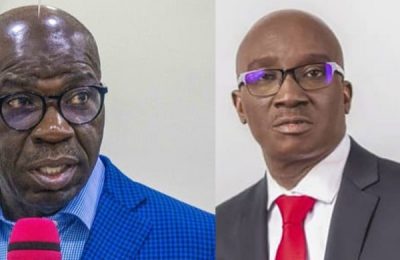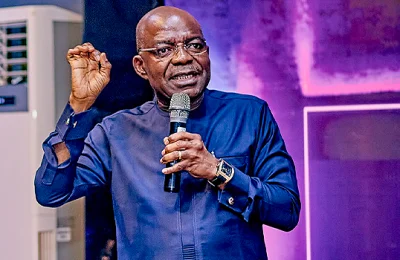
Nationnewslead reports that Until February 27 last year, messages about wearing face masks in crowded places, observing social/physical distancing and other non-pharmaceutical protocols would have been a misnomer in Nigeria. But, no thanks to an Italian man who visited Nigeria on a business trip, such messages on safety protocols are now sweet music to the ears of Nigerians.
As the COVID-19 pandemic gripped the whole world with a shock, thereby overwhelming the health system of most nations, new ways of living and doing things (the new normal) gradually emerged. In Nigeria, the incidence of COVID-19 grew steadily, moving from an imported case and elitist pattern to community transmission within months.

How and where it all began
The World Health Organisation (WHO) declared COVID-19 outbreak, which began in Wuhan, China, on December 8, 2019, a public health emergency of international concern on January 30, 2020. Following the WHO declaration, Nigeria constituted a Coronavirus preparedness group in Nigeria (a country with 36 states and a Federal Capital Territory [FCT]), with WHO categorising Nigeria as one of high-risk African countries with weak healthcare system.
Although social distancing negates regular social interaction, which is the bedrock of interaction in the African society, the contagious disease also limited social relations and disrupted the usual norms of close physical contacts in Nigeria. Human migration was restricted as airports were shut, while social events/gatherings such as sports, festivals, parties, etc were outlawed through stay-at-home directives. It was tough for most Nigerians, but health authorities explained that the new normal is necessary because COVID-19 is transmitted through contact with individuals who have contracted the disease.
While Nigeria had boasted consistently that it had strengthened surveillance at the airports since January 2020, the country recorded its COVID-19 index case, which was imported from Italy, on February 27. At the time, many critics raised concerns about the effectiveness of airport surveillance claims and, by extension, the country’s general preparedness. It was also claimed that the index case (an Italian) had visited some other states of the federation before testing positive for COVID-19, further exposing Nigeria’s pre-COVID-19 preparedness as inadequate.

Of a fact, the start of COVID-19 sent panic across Nigeria, like in every other country. From one imported index case, Nigeria grappled with tremendous health challenges as infection grew into multiple cases, claiming many deaths. Having confirmed the index case, the NCDC activated a multi-sectorial National Emergency Operations Centre (EOC) to oversee the national response to COVID-19. Subsequently, the Presidential Task Force (PTF) for Coronavirus control was inaugurated on March 9, 2020. Nigeria, like other countries, announced restriction for travelers from 13 COVID-19 high-risk countries from entering the country. However, by the time the ban took effect, Nigeria had recorded more imported cases, most of who arrived in the country without complying with the 14 days self-isolation recommended by the NCDC.
At some point last year, the NCDC disclosed that all confirmed cases of COVID-19 in the country, especially between February 27 and March 17 (first 30 days after index case) were imported from abroad by returning travelers. As of March 27, one month after the first case, ten states in Nigeria had recorded 81 clinically confirmed cases, with three patients fully recovered and one death reported. By April 5, the number of positive cases had increased exponentially to 232, with death toll rising to five; while 33 persons had recovered among 14 states with positive cases in Nigeria then.
New COVID-19 variant amidst second wave
Months later, in December 2020, the Africa Centre for Disease Control and Prevention (CDC) claimed a new Coronavirus variant was found in Nigeria, saying “it’s a separate lineage from the UK and the South African lineages.” That was how news media became agog with claims that Nigeria had slipped into a second wave of the virus. Last December alone, Nigeria had 19,019 new cases, raising the total number of confirmed cases in the country to 86,576. In this same month, death toll rose to 1,278; while the number of recovered patients increased to 73,322, leaving 11,976 active cases at the end of December.
In January this year, Nigeria reached the milestone of 100,000 confirmed cases, with the country’s first case of the B.1.1.7 variant confirmed on 25 January. There were 44,666 new cases in January, raising the total number of confirmed cases to 131,242 as fatalities rose to 1,586. The number of recovered patients increased to 104,989, leaving 26,667 active cases at the end of the month. Perhaps, this was what prompted Boss Mustapha, Secretary to the Government of the Federation and chairman of PTF, to declare that the second wave of the pandemic has begun in the country, following sudden upsurge of COVID-19 cases in the country.
Despite several victims’ narrations, many Nigerians still believe the virus is a scam, while a few others who believed lived with the insinuation that the cases recorded in the first wave of the pandemic was inflated to get funds and grants for states to enrich some officials through contracts award. During the significant drop of the cases recorded between September and November 2020 that lead to the relaxation of the lockdowns and re-opening of the economy to prevent the second phase of economic meltdown, the isolation centres in most states were partially closed, and the country relaxed the usage of face masks in public places. Social distancing, important in the early days of the virus, has also been largely jettisoned as more people congregate in public places without adhering to the health requirements.
On December 10, Dr. Osagie Ehanire, Minister of Health, acknowledge that the second wave is real because of the rising number of cases. According to him, the rise in cases was mostly driven by an increase in infections within communities and, to a lesser extent, travelers entering Nigeria. Officially, Nigeria entered the second wave of the pandemic on 17th December 2020, which coincided with the day the country recorded its highest daily number of COVID-19 cases with 1,145 new infections.
Agitation for better welfare package for frontline health workers
As Nigeria struggled to contain the spread of the deadly virus, issues pertaining to allowances and remunerations for frontline healthcare workers erupted into a national crisis. For weeks, especially between June and August last year, medical workers involved in the fight against the spread of COVID-19 had to abandon their duty posts to press home their demands for better compensations.
Across Nigeria’s 36 states, including FCT, health workers on the frontlines said there was no cause for them to smile as far as their welfare was concerned. They said both the federal and state governments failed to honour promises, especially in the payment of allowances, which they said were either slashed arbitrarily at some point or always late in coming. At the time, besides strike actions in states called by local chapters of professional unions that abound in the health sector, NARD led a nationwide downing of tools in June and August during COVID-19 emergency.
Dr. Aliyu Sokomba, NARD President, explained at the time that health workers were compelled to abandon their duty post as a result of the government’s failure to honour agreements reached with resident doctors. Non-payment of health workers’ hazard allowance, lack of life insurance for doctors, and the dearth of PPE in hospitals, among other reasons, were at the heart of the issues that necessitated strike actions.
Striking workers were persuaded to return to work, with the federal government, which said N30.5 billion was spent on COVID-19 in the first four months, disclosing that additional N8.9 billion had been approved to settle welfare issues raised by frontline workers. On September 11, Mustapha said the additional N8.9 billion was meant for COVID-19 hazard allowances for all health workers in Nigeria. He added that the procurement of PPE for hospitals and isolation centres would also be prioritised moving forward.
At the beginning of the fight against the pandemic, the federal government had promised a special COVID-19 hazard and inducement allowance of 50 per cent of Consolidated Basic Salary to health workers in the federal health institutions and designated Covid-19 centres. But professional associations in the healthcare industry said the government did not fulfil its promises. Before this, health workers received N5,000 as hazard pay across the board – though health unions said they are optimistic that a new allowance is being worked out.
Many frontline health workers lost their lives
Many healthcare workers died in the frontlines, as COVID-19 infections among them became a crisis at some point. As at 29th August last year, NARD said 321 out of its 1,031 members had tested positive, 68 had recovered and 14 doctors had died. As at the same date, the Association of Medical Laboratory Scientists of Nigeria (AMLSN) said 150 out of its own 800 members engaged in fighting the spread of the virus had tested positive for Covid-19; while 28 had died.
Also, Nigerian pharmacists under the aegis of the Pharmaceutical Society of Nigeria (PSN) and Association of Hospital and Administrative Pharmacists of Nigeria (AHAPN) announced in June that six of their 359 frontline workers had tested positive to COVID-19. Casualties on the frontlines are however not limited to Nigeria, as infection and fatality rates among healthcare givers deployed into COVID-19 war in more advanced countries also appeared more disturbing.
Nigeria appreciates health workers’ sacrifices, says NCDC boss
NCDC Director-General Dr. Chikwe Ihekweazu said the country owes its relative success in managing the COVID-19 crisis to the efforts and sacrifices of its health workers, saying their sacrifices would never be forgotten.
“We are very grateful for the efforts and sacrifices by our health workers involved in the clinical management and public health response to Covid-19 in Nigeria. For most of us, our lives have changed since the first case was recorded in Nigeria in February. Health workers have to ensure laboratories are running 24-7 to meet the huge demand for testing, work long hours to ensure patients are well cared for and several other response activities. In most cases, we are at higher risk and have to take extra measures to protect ourselves while providing critical service to the country.
It is difficult to quantify the number of health workers involved in Nigeria’s Covid-19 response, as we have personnel working across various capacities. There are health workers providing care to Covid-19 patients; there are others who are involved in the public health response such as risk communications, patient counselling, surveillance, outbreak investigation, sample collection and testing among other activities. Most of the human resources in Nigeria’s health sector have been involved in the response to Covid-19.
“Notwithstanding, we continue to urge all health workers to practice standard care precautions. Health workers should maintain the required distance where possible and wear appropriate PPE while attending to any patient, irrespective of the condition of the patient. We will continue to provide adequate training, medical supplies and other resources needed by health workers to protect themselves when managing COVID-19 cases,” he said.
The NCDC boss admitted that the last one year has been an extraordinary year for health security in Nigeria and across the world. “In Nigeria, we have recorded over 150,000 cases across all 36 states and the Federal Capital Territory. Sadly, we have lost more than 1,800 people.
One of the biggest strengths of our response to this pandemic has come from the power of coordination, collaboration and solidarity. The Presidential Task Force on COVID-19 has provided strong leadership and co-ordination to enable a multi-sectoral response. Our states have risen to the challenge by investing further in their health security and collaborating with us at NCDC and the PTF-COVID-19. The Nigerian Governors’ Forum has also created a well-defined structure for us to engage with the state governors.”
He stressed that the strong support from partners, including the organised private sector in Nigeria, has supported the country’s response activities. “We are also grateful to all Nigerians who have shown resilience in protecting themselves and our country and in supporting others.
In the last one year, NCDC has led the activation of at least one molecular laboratory for testing in every state. We have completed the roll out of SORMAS for digital surveillance and reporting of infectious diseases across the country. Thousands of health workers have been trained in several areas including infection prevention control. We have supported the renovation of several treatment centres and begun the establishment of 17 treatment centres for infectious diseases. “Five of these have been completed. As the science around the response evolved, we have developed over 50 guidelines for health workers and the general public. Every single week, we have published a situation report on the epidemiology of the disease and our response activities. We have also maintained communication with Nigerians through social media, SMS, television, radio, newspapers and other means. Our response has been focused on controlling the acute phase of his pandemic but also building sustainable structures for future outbreaks. With the development of a vaccine and ongoing efforts to introduce these in Nigeria, we are much closer to the finishing line than we were one year ago.
“Although the number of cases and deaths in Nigeria and the rest of Africa has been less than countries in other regions of the world, the pandemic has had a toll on lives and livelihood. It has also provided an opportunity for further investment in health security.
Scientific understanding of the virus is still evolving, and many variables may contribute to this difference, including population density and age distribution, governments’ experience with previous outbreaks and low prevalence of non-communicable diseases compared to most other countries in the Global North.
“Our immediate focus is to control the acute phase of the pandemic. Many countries outside of Nigeria have begun to record a decline in the number of cases as vaccination begins. Our sister agency NPHCDA is working very hard to ensure access to vaccines in the very near future. We urge Nigerians to continue practicing the known measures to protect ourselves – regular handwashing with soap and running water, avoiding large gatherings especially indoors, proper use of face masks and physical distancing. We are much closer to the end of this pandemic, than we were one year ago,” he said.
Advertise or Publish a Story on Nationnewslead: Kindly contact us @ Nationnewslead@gmail.com Call or Whatsapp: 08168544205, 07055577376







